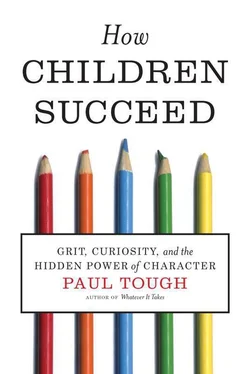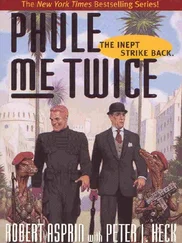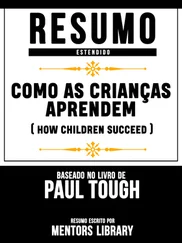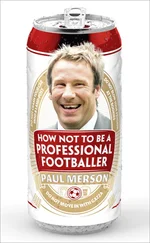They gave low ratings to employees: Ibid., 137–38.
“there is no true disadvantage”: Peterson and Seligman, Character Strengths and Virtues, 515.
Overcontrolled people are “excessively constrained”: Tera D. Letzring, Jack Block, and David C. Funder, “Ego-Control and Ego-Resiliency: Generalization of Self-Report Scales Based on Personality Descriptions from Acquaintances, Clinicians, and the Self,” Journal of Research in Personality 39, no. 4 (August 2005).
In 2011, that pool of evidence grew further: Terrie E. Moffitt et al., “A Gradient of Childhood Self-Control Predicts Health, Wealth, and Public Safety,” Proceedings of the National Academy of Science 108, no. 7 (February 2011). See also Paul Solman, “Self-Controlled Kids Prosper as Adults: ‘Fatalistically Depressing’?,” PBS NewsHour, June 13, 2011.
Duckworth developed a test to measure grit: Angela Lee Duckworth and Patrick D. Quinn, “Development and Validation of the Short Grit Scale (Grit-S),” Journal of Personality Assessment 91, no. 2 (2009); and Angela L. Duckworth, Christopher Peterson, Michael D. Matthews, and Dennis R. Kelly, “Grit: Perseverance and Passion for Long-Term Goals,” Journal of Personality and Social Psychology 92, no. 6 (2007).
a national organization called the Character Education Partnership: Character Education Partnership, Performance Values: Why They Matter and What Schools Can Do to Foster Their Development (Washington, DC: Character Education Partnership, April 2008).
“unexpectedly high rates of emotional problems”: Madeline Levine, The Price of Privilege: How Parental Pressure and Material Advantage Are Creating a Generation of Disconnected and Unhappy Kids (New York: HarperCollins, 2006), 21.
“intense feelings of shame and hopelessness”: Ibid., 30.
To Luthar’s surprise, she found the affluent teenagers: Suniya S. Luthar and Chris C. Sexton, “The High Price of Affluence,” in Advances in Child Development, vol. 32, ed. R. V. Kail (San Diego: Academic Press, 2004), 143; Suniya S. Luthar and Karen D’Avanzo, “Contextual Factors in Substance Use: A Study of Suburban and Inner-City Adolescents,” Development and Psychopathology 11, no. 4 (1999).
in an even more affluent town: Luthar and Sexton, “High Price of Affluence,” 134.
multiple persistent problems: Suniya S. Luthar and Shawn J. Latendresse, “Children of the Affluent: Challenges to Well-Being,” Current Directions in Psychological Science 14, no. 1 (February 2005): 51.
“excessive achievement pressures and isolation from parents”: Luthar and Sexton, “High Price of Affluence,” 135.
Kindlon discovered disproportionately high levels of anxiety: Dan Kindlon, Too Much of a Good Thing: Raising Children of Character in an Indulgent Age (New York: Hyperion, 2001), 10.
parents making more than one million dollars a year: Ibid., 18, 246.
“tell students exactly how they are expected to behave”: Whitman, Sweating the Small Stuff, 3.
some of Levin’s harsher moments of discipline: Mathews, Work Hard , 214.
“models an atmosphere of punitive dependence”: Tom Brunzell, “Kaboom! Confronting Student Resistance at the Moment of Impact: A Case Study of KIPP Infinity Charter School,” unpublished thesis (December 2006), 1.
Only 24 percent of the incoming students: Ibid., 20.
“before puberty, but late enough in childhood”: Seligman, Learned Optimism (second edition), ix.
“creates a strong association between future and reality”: Angela Lee Duckworth, Teri Kirby, Gabriele Oettingen, and Anton Gollwitzer, “Mental Contrasting with Implementation Intentions Improves Academic Performance among Economically Disadvantaged Children,” Journal of Applied Developmental Psychology (in press).
Oettingen has demonstrated the effectiveness: Ibid., 7.
“provide structure, preparing us for encounters”: David A. Kessler, The End of Overeating: Taking Control of the Insatiable American Appetite (New York: Rodale, 2009), 190.
before trying a ten-hole mini golf course: Jeff Stone, Christian I. Lynch, Mike Sjomeling, and John M. Darley, “Stereotype Threat Effects on Black and White Athletic Performance,” Journal of Personality and Social Psychology 77, no. 6 (December 1999).
When people in their sixties: Claude Steele, Whistling Vivaldi: And Other Clues to How Stereotypes Affect Us (New York: W. W. Norton, 2010), 99.
the malleability of intelligence: See, e.g., Joshua Aronson, Carrie B. Fried, and Catherine Good, “Reducing the Effects of Stereotype Threat on African American College Students by Shaping Theories of Intelligence,” Journal of Experimental Social Psychology 38, no. 2 (March 2002).
Dweck divides people into two types: Carol S. Dweck, Mindset: The New Psychology of Success (New York: Ballantine Books, 2008).
students’ mindsets predict their academic trajectories: Lisa S. Blackwell, Kali H. Trzesniewski, and Carol S. Dweck, “Implicit Theories of Intelligence Predict Achievement across an Adolescent Transition: A Longitudinal Study and an Intervention,” Child Development 78, no. 1 (January/February 2007): 251.
a growth-mindset message: Catherine Good, Joshua Aronson, and Michael Inzlicht, “Improving Adolescents’ Standardized Test Performance: An Intervention to Reduce the Effects of Stereotype Threat,” Applied Developmental Psychology 24, no. 6 (December 2003). Catherine Good, Joshua Aronson, and Michael Inzlicht, “Improving Adolescents’ Standardized Test Performance: An Intervention to Reduce the Effects of Stereotype Threat,” Applied Developmental Psychology 24, no. 6 (December 2003).
after I read an article in the New York Times: Dylan Loeb McClain, “For School, National Chess Champions in 3 Grades,” New York Times, December 20, 2008.
“a hard-charging bunch of 10-to-12-year-olds”: Mark Jacobson, “Mr. Times and His Knights of the Square Table,” New York, May 21, 2005.
Take a look at the team winners: 2010 National K–12 Championships, United States Chess Federation website; see http://www.uschess.org/tournaments/2010/k12/?page=RESULTS.
“finest chess playing entity on the planet”: Bruce Weber, “Swift and Slashing, Computer Topples Kasparov,” New York Times, May 12, 1997.
Newsweek had run a story : Steven Levy, “Man vs. Machine,” Newsweek, May 5, 1997.
“I’m a human being”: Weber, “Swift and Slashing.”
what he called the Levitt equation: Jonathan Levitt, Genius in Chess: Discover and Develop Your Chess Talent (Seattle: International Chess Enterprises, 1997), 40.
“completely misguided”: Jonathan Rowson, “Beyond the Illusion of ‘Talent,’” New in Chess, June 2009.
“Most of the major academic studies of chess”: Jonathan Rowson, The Seven Deadly Chess Sins (London: Gambit Publications, 2000), 16.
“your ability to recognize and utilize your emotions”: Ibid., 17.
“I am such a stupid retarded disgusting mindless child”: Elizabeth Vicary, “North American Open Round Two: Why Am I Such a Huge Baby?,” Elizabeth Vicary’s Blog, December 31, 2007, http://lizzyknowsall.blogspot.com/2007/12/north-american-open-round-two-why-am-i.html. (Elizabeth Spiegel’s maiden name was Vicary. She was married in 2011.)
Читать дальше



![Коринн МакКей - How to Succeed as a Freelance Translator [calibre 3.46.0]](/books/402693/korinn-makkej-how-to-succeed-as-a-freelance-transl-thumb.webp)








